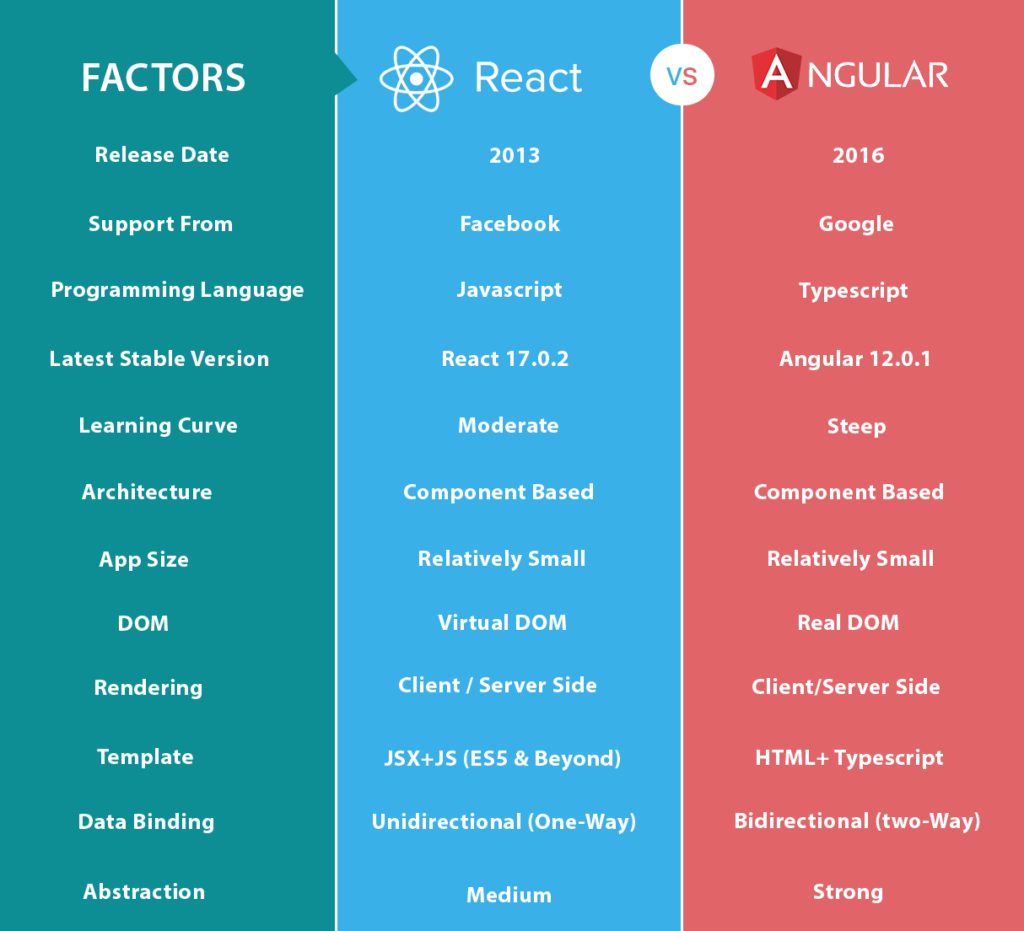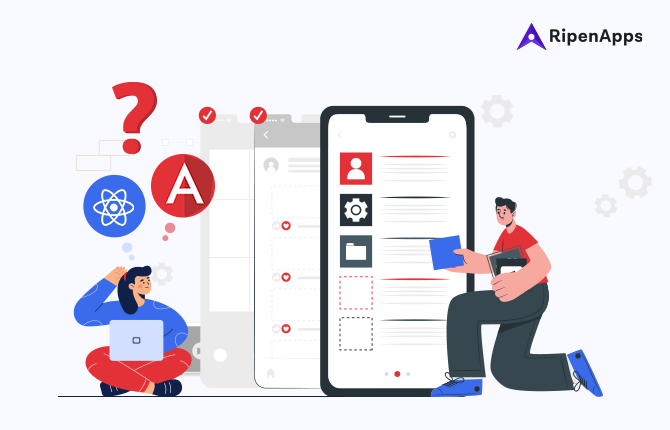React vs Angular? Which framework should opt for mobile app development? The question is very obvious as both the frameworks are backed up with a bunch of benefits and have formulated various brands. Out of all the frameworks in the market- React and Angular have their prime place due to their features & functionalities. These two are on the top among top JS frameworks.
Well, various brands have chosen React and made their huge name in the market, on the other hand, brands that have chosen angular are touching the sky. Hence, confusion is obvious, as you are going to make your brand a popular one with the help of these two mind-blowing frameworks. It’s natural to compare two best things as there is always a competition occurs between two bests so here is.
This article is to give an exclusive view of React VS Angular and its benefits. The comparison is also a must as they both backed with two giants competitors- Google & Facebook. Let’s uncover the winning insights about React and Angular and also find why businesses should invest in web apps in 2023?
Table of Contents
Stats Indicating Why Businesses Should Invest In Web Apps in 2023
According to the survey, 90% of the mobile time is spent on mobile apps and 10% on the rest of the internet, including websites.
A mobile app user spends 201.8 minutes per month on shopping apps, whereas a website user will spend 10.9 minutes/per month.
Users view 4.2x more products in a mobile app than the website. Therefore, 3x higher conversion rates are expected from the mobile apps and 1.5x via desktop.
It is expected that mobile apps are expected to make more than $700 billion in annual sales by the end of 2023.
These are the key stats of why businesses should invest in web apps and let’s have a clear definition of both of the frameworks.
React vs Angular Comparison
There are certain factors on which one can lay down the comparison of the two most popular app development frameworks. We will cover all these factors and lay down the conclusion so that you can decide between the two. Below is the React vs. Angular comparison infographic in case you want to take a sneak peek at the article.

React vs. Angular: What Exactly Are They?
Both frameworks have huge market popularity and carry various benefits that aid the app development process and deliver mind-blowing, unmatched solutions.
Let us start the comparison by first understanding both frameworks in detail. You will notice a decent difference between the two right from the introduction.
React JS
React is a Javascript library developed by Facebook which allows you to build UI components. It facilitates the creation of interactive User Interfaces. It also makes the code easier to understand and launch. React JavaScript framework uses server-side rendering to provide a flexible, performance-oriented solution. The framework is highly popular among cross-platform app development service providers around the globe.
Angular
Angular is a structural framework for developing dynamic web apps. It allows developers to use HTML as a template language and allows HTML’s syntax to express the application’s components briefly and clearly. Angular is a fully-featured JavaScript framework that helps develop dynamic, single-page web apps. It also supports the MVC programming structure.
After covering the major introduction details for React and Angular, it’s time to begin the core battle between these two benefit-loaded frameworks.
React VS Angular Popularity Comparison
Before unlocking the major benefits and deciding on which framework to use, it is a wise move to have a look at its popularity. As per the research, there are some popularity stats of these two frameworks.
Stack Overflow names React.js the most loved and most wanted web framework by developers (74.5%). Angular has a lower rate – 57.6% of developers are interested in working with it.
| React | Angular | |
| Watchers | 6.7k | 3.2k |
| Stars | 164k | 70.9k |
| Forks | 32.9k | 18.6k |
| Contributors | 1,533 | 1,352 |
React VS Angular Benefits comparison
Both the app development frameworks offer extensive benefits to the businesses. However, the choice may vary according to the business requirements.
Benefits of React
-Interactive User Experience
React uses the Virtual DOM. This makes it simpler for the React app developers to refresh changes performed by the customers in the app without influencing different pieces of the interface.
This outcome in building a profoundly unique UI with the choice user experience.
-Efficient yet less time consuming
React is time-saving as it provides code reusability where app developers and app development companies can use the same code component. Plus, the segments are separated from one another, and updates in one don’t influence the other, which makes it simpler to deal with the updates.
This code reusability makes React the best choice, time-saving, efficient for app development companies and app developers.
-Faster Development
React permits the app developers to reuse the existing code and apply hot reloading into the process. This existing code reusing makes the whole app development process faster as it saves time from writing the whole code again.
-Quicker Testing
React broadly uses Redux what cuts down the issue of component storage and management in huge measured and complex apps with huge powerful components.
It assists the developers with adding the app state in a solitary object and engages each part of the app to get to the app state without including the child component or utilizing callback. This makes it simpler to test the app and log data changes, alongside the utilization of hot reloading and other such tools.
-Code Stability
ReactJS let the developers work straightforwardly with the components and utilize downward data binding to guarantee that the parent elements don’t get influenced by the progressions of child entities. This methodology makes the code stable and supports the possibility of development later on.
Benefits of Angular
-Platform Independent
Angular provides the benefit of developing across all platforms. Learn one approach to build applications with Angular and reuse your code and capacities to build applications for any deployment target. For web, mobile web, native mobile, and native desktop.
-Faster Speed & Performance
Accomplish the most extreme speed conceivable on the Web Platform today, and take it further, using Web Workers and server-side delivering.
Angular places you in charge of scalability. Meet huge data necessities by building information models on RxJS, Immutable.js, or another push model.
-Mind-blowing Tooling
This framework allows to build features rapidly with straightforward, declarative templates. Extend the template language with your parts and use a wide exhibit of existing segments. Get prompt Angular-specific assistance and input with practically every IDE and proofreader. This meets up so you can zero in on building astounding applications instead of attempting to make the code work.
-Adored by Millions
From prototype through global deployment, Angular conveys the efficiency and scalable framework that backings Google’s biggest applications.
React VS Angular Core Technical Comparison
For non-technical audience the above pointers are vital. However, if you are from core technical background then here are is the technical comparison on number of factors.
Purpose
ReactJS is a Library that cares often about View on MVC design, needs Flux to execute this architecture, yet gives you more opportunity how you need to put together the code.
While Angular is a Full-fledged Framework that offers a solid opinion on how your app ought to be organized and has numerous small libraries worked in that assists you with building complex apps.
Data Binding
React empowers one-way data binding which implying that a UI component can’t change the condition of a segment. While two-way data binding that implies that if we change the contribution to the UI it will change the model state and the other way around.
Language
Angular can use TypeScript, a superset of JavaScript and a statically typed language. In TypeScript, mistakes are simpler to spot, and by and large, the code is simpler to explore.
React can be composed in JavaScript ES6+ joined with JSX script, which comprises an extension for syntax, making a JavaScript code indistinguishable from HTML. To assemble the JSX code in a program, React can be expanded with code interpretation tools (for example Babel). Further, React can likewise be written in TypeScript, yet it is excluded natively.
UI Components
Precise gives different material design components, with assorted layouts, buttons, pop-ups, etc. This takes into account seamless and quick UI configurations.
When using React, it is important to install Material-UI Library & Dependencies to utilize the material design parts accessible. These UI devices are created by the native area and offer a tremendous assortment of UI segments.
Dependency Injection
Dependency injection is a programming technique utilized when classes get references to different classes (dependencies). Dissimilar to React, Angular backings Dependency Injection, which permits it to have distinct lifecycles for various stores. All things considered, React doesn’t uphold Dependency Injection, having a worldwide state for every one of the parts, which does not comply with data immutability and the concept of functional programming.
DOM
React supports Virtual DOM where, at whatever point the DOM transforms it will make another virtual DOM, contrast, and past only alter the “real” DOM where it varies.
What’s more, Angular backings Incremental DOM -while making the new DOM it will contrast and the past one and apply the distinctions to the “real” DOM, possibly dispensing memory if vital.
Performance
React appears to have an edge over Angular in runtime performance because of the Virtual DOM trees, which are based on server and exceptionally lightweight, accordingly not loading the program a lot. Further, with React, the data-binding process is unidirectional, implying that ties are not assigned watchers, and thusly, the responsibility is diminished.
The equivalent doesn’t occur with Angular. Since it has a bidirectional data binding process, each limiting requires a watcher to follow adjustments, and each circle stays until every one of the watchers is affirmed. Subsequently, Angular’s presentation may be adversely affected by the bidirectional data binding interaction. In any case, it might change with the expansion and improvement of new technology Ivy to Angular.
Tool
From what we can see, Angular has unexpected features in comparison to React. Also, React is more reliant upon a state the board library. Around there, libraries, for example, Helmet, Redux, and React Router can streamline the state of the executive’s measures, the communication with the API, and steering. Conflictingly, Angular doesn’t need extra libraries and incorporates a few capacities (for example data binding, project generation, and component-based routing) in its bundle. Notwithstanding, whenever wished, it can use the assistance of state the executives libraries (like NgRx and RxJS) to improve its features.
React VS Angular: Top Apps

Both the framework and library are being backed by some of the top companies in the world. Here see the project’s name.
React VS Angular: When To Choose What?
In this part, we would talk about the circumstances that are positive for the utilization of Angular or React.
When to Choose React?
React is uses to foster single-page and cross-platform app development effortlessly. They can be utilized to broaden an app’s current abilities. React has made it workable for developers to make light apps that have present-day capacities in a brief time frame. React offers plenty of benefits, one of them is the accessibility of apparatuses that can be utilized to customize your page effortlessly.
When to Choose Angular?
You ought to pick the Angular framework when fostering a large-scale app that is stacked with different features. It gives you a solid and scalable system. The utilization of the Angular framework makes the development of continuous message apps simple. Likewise, groups knowledgeable in TypeScript discover Angular simpler to work with.
Conclusion
Given so many frameworks to choose from, each one with its benefits and peculiarities, deciding on the right framework can become a tough mission.
However, in the decision-making process, it’s important to consider that React has an easier learning curve, which leads to quicker development, while Angular has more built-in functionalities.
At RipenApps we have experienced software developers in Angular and React. Need a boost in building your web or mobile application in one of these technologies? Contact us now!










 India
India USA
USA Australia
Australia Canada
Canada UK
UK UAE
UAE